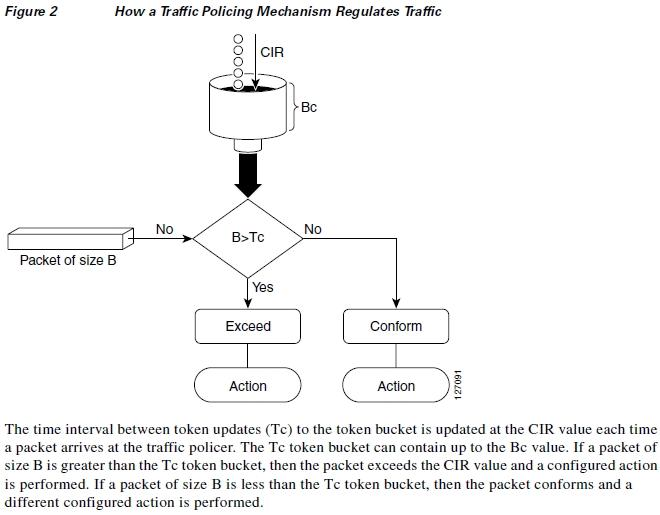

Which three conditions can occur when metering traffic using a dual token bucket traffic policing QoS mechanism on Cisco routers? (Choose three.)
Correct Answer:
ACD
🗳️

What is the correct formula for determining the CIR?
Correct Answer:
A
🗳️
Committed Information Rate (CIR) the rate the device will send at (on average) over a one second period.
The default CIR when traffic-shaping is enabled on the interface is 56K. CIR is also referred to as the "target rate". Since the device is forced to send at the AR, it does not send all of the time (within one second) in order to send an average amount of data that equals the CIR.
Minimum CIR (mincir) the rate the service provider guarantees to accept. Theoretically, the provider will set the DE bit for all traffic above this rate. Mincir is designed to be used in conjunction with adaptive shaping. With adaptive shaping, the router will throttle down in the event of congestion. The router will not throttle down below this value.
Committed Burst (Bc) the number of committed bits allows to be sent during a given interval. The device sends an average amount of traffic to achieve the CIR.
The Bc value defaults to 1/8 of the configured CIR for speeds below 650K. For speeds above that, it is roughly 1/16 of CIR.
Excess Burst (Be) – the number of non-committed bits the router is allowed to send above Bc during the first interval (Tc). The amount of Be "credits" is derived from unused Bc credits in previous intervals. There is no limit to how long Be can "store" unused Bc credits. It is a common misconception that Be can only store credits from the previous interval or the previous second. There is no default Be value.
Committed Rate Measurement Interval (Tc) the time interval over whic Bc or Bc+Be can be transmitted. The max value is 125 ms and the minimum value is 10 ms.
The Formula -
CIR, Tc, and Bc are related mathematically by the following formula:
CIR = Bc/(Tc/1000) Notice the division of Tc by 1000 is used to convert milliseconds into seconds the common measurement of CIR and Bc.
DS-TE implementations on Cisco routers support which bandwidth pool(s) and class type(s)? (Choose two.)
Correct Answer:
CF
🗳️
Differential Service Tunnels -
Differential Service Traffic Engineering (TE) is an extension of the regular MPLS Traffic Engineering (MPLSTE) feature. Regular TE does not provide bandwidth guarantees to different traffic classes. A single bandwidth pool (global pool) is used in regular TE that is shared by all traffic. In order to support various class of service (CoS), the ability to provide multiple bandwidth pools is required. These bandwidth pools then can be treated differently based on the requirement for the traffic class using that pool.
In RSVP global and subpools reservable bandwidths are configured on a per interface basis to accommodate TE tunnels on the node. Available bandwidth from all configured bandwidth pools is advertised using Interior Gateway Protocol (IGP). RSVP is used to signal the TE tunnel with appropriate bandwidth pool requirements.
Which field in the MPLS shim header is used to support different QoS markings?
Correct Answer:
C
🗳️
MPLS EXP Marking -
The three MPLS EXP (experimental) bits in the shim header of an input or output MPLS packet header may be set or changed by a user configured value